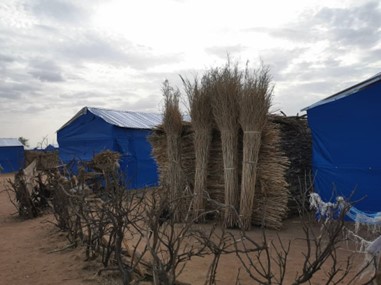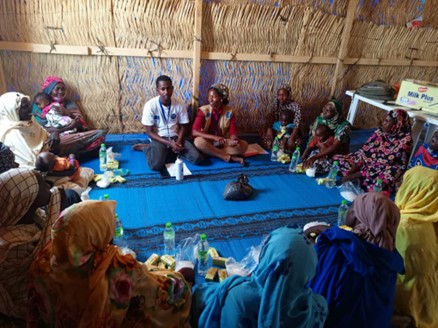On this day, 20 June, dedicated to highlighting the rights, needs and resilience of people forced to flee their country, Acted Chad, thanks to funding from the European Commission for Humanitarian Aid and Civil Protection (DG ECHO), is highlighting two stories of hope and emancipation.
As part of its multi-sectoral emergency project in Eastern Chad, Acted is supporting community-based safe spaces run by refugee women who are former social workers on the Adré site. Acted is also involved in the protection of refugees through the construction and rehabilitation of shelters using a new approach to ensure community participation and the local anchoring of the intervention.
Acted asked beneficiaries to share their views. What follows are their views on the project and World Refugee Day.

Since the conflict broke out in Sudan more than a year ago in April 2023, more than 750,000 refugees and returnees have fled to eastern Chad, particularly to the Ouaddai province via the Adré border entry point. Among this massive influx of refugees, 61% of those registered are minors. Many refugees were attacked as they left Darfur with the little they could carry. Women were arrested and searched, and some refugees witnessed the murder of their loved ones before reaching Chad, where they were welcomed by the local community.
In this context, Acted quickly intervened with a multi-sector emergency aid in water-hygiene-sanitation (WASH), shelter-AME (essential household items), food security, protection and since 2024, in camp coordination and management (CCCM). Acted is supported by DG ECHO, the Crisis and Support Centre (CDCS) of the French Ministry of Europe and Foreign Affairs, the Normandy Region, the World Food Programme (WFP) and Startfund, and works in collaboration and coordination with local partners, local authorities and communities and humanitarian actors.
The simple power of safe spaces: making a big impact by giving people a choice
The very idea of a safe space is not obvious: what is ‘safe’? Safe from what? From what? Who needs a safe space and what does it consist of? All these questions are part of the development of an initiative with refugee women who are former social workers in Sudan and are constantly discussed with the community.
Safe spaces are part of the protection component of Acted’s projects on the Adré site. As part of its protection activities, Acted organised 12 focus groups on PSEA (Prevention of Sexual Abuse and Exploitation) in May 2024. In addition, the 20 community relays ensure the conduct of awareness-raising activities on cross-cutting themes throughout the site: good hygiene practices and prevention against hepatitis E, complaints management mechanism, PSEA and gender-based violence (GBV). Finally, as part of training and support for protection committees, 39 people (including 13 women) were trained in cross-cutting protection, GBV and the importance of women’s role in community decision-making.
It is precisely in this context that community safe spaces can develop. A community listening centre, entirely initiated and run by refugee women, allows other women on the site, in their own words, “to share ideas, relieve stress and create links with other women”. The volunteer refugee women themselves train the women and girls in techniques for making traditional juices, cakes, jars, fans and bags; they raise awareness and provide care for victims of GBV, distribute dignity kits and refer women to health facilities for prenatal consultations.
Open from Monday to Thursday, 8am to 4pm, the centre welcomes at least 40 people a day. According to the participants, it reflects the community structure and mechanisms they had in their original neighbourhoods. To date, more than 150 women have been trained in income-generating activities, laying the foundations for financial independence and holistic protection against violence.
A shelter is a local and intimate support for everyone
The logic of emergency response is to provide the most appropriate aid in the shortest possible time and in the most effective way. As a result, many considerations are often set aside because priorities are set elsewhere. Throughout these considerations, the focus is and must always be on the beneficiary. This is why, as part of the emergency shelter activities carried out by Acted in the camps set up in coordination with the Commission Nationale d’Accueil de Réinsertion des Réfugiés et Rapatriés (CNARR), consultations were central to adopting the best approach.
In the Ourang camp, Acted interviewed more than 90 households after the distribution of shelters and essential household items (EHI) kits out of the 234 that had benefited from new shelters, in order to obtain their perceptions of their living conditions. In the rehabilitation phase that followed, 6 to 9 months after the emergency, Acted was able to adapt the approach on the basis of feedback from the communities, prioritising the use of local materials, the adaptation of the renovation to the needs of each family and the participation of the beneficiaries in the rehabilitation activity itself, enabling greater ownership of the housing. In Ourang, 92% of beneficiaries said they were satisfied with the quality of their shelter.
At the same time, Acted is committed to ensuring strong accountability and two-way communication with beneficiaries. Thus, the complaints management mechanism put in place by Acted, based on a local complaints management committee, was considered adequate and provided a rapid response to all respondents.
This approach to shelter rehabilitation ensures the empowerment and participation of refugees. Just because someone has fled their home and is in need of quick shelter does not mean that an action cannot be adapted to the environment, the particular needs and provide an opportunity for empowerment. Constant consultation not only improves relations with beneficiaries, but is the primary source of effective action.
A message from refugees on World Refugee Day
The messages collected by Acted from Sudanese refugees in Eastern Chad on World Refugee Day are the basis for the continuous improvement of projects and the development of initiatives centred on the territory and local know-how.
When Acted asked them what message they wanted to get across, the first response was to reiterate their categorical rejection of violence and war, the primary source of displacement and suffering, and to demand fair resettlement opportunities for all. The theme of equal opportunities was widely raised, particularly with regard to equal rights for refugees fleeing conflicts around the world. Many people feel discriminated against in their access to refugee status. Another common theme is the desire to engage more in inter-community dialogue with the host population in order to learn from each other and prevent tensions. The Chadian host community has indeed shown exceptional hospitality and generosity towards refugees. The willingness to intensify dialogue is a good starting point for durable solutions. It underlines the multidimensional and intersectional nature of refugee issues, which are often simplified and considered in isolation from the countless factors that influence each other.

A safe space and shelter are the foundation of a dignified life, regardless of a person’s status. Thanks to funding from ECHO, the CDCS and the Normandy Region, the Acted team can highlight success stories on World Refugee Day 2024, in the context of the humanitarian crisis caused by the war in Sudan. Between this day and next year, Acted intends to continue and intensify its efforts by placing the community at the centre of its interventions, particularly in the CCCM, WASH, shelter-AME and Protection sectors.
Faced with growing needs and limited resources, Acted is continuing its advocacy efforts in favour of more sustainable solutions, particularly in the informal site of Adré, where the rainy season and regular arrivals are putting a strain on existing services.